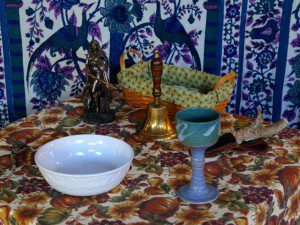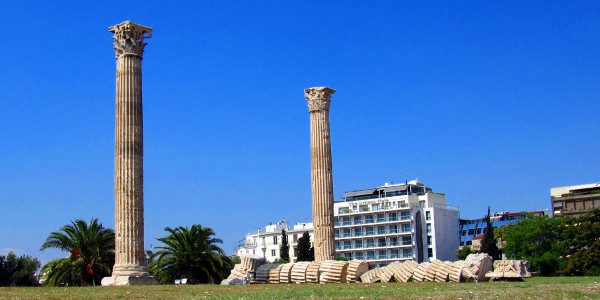 Last Sunday’s post Druidry Is Not My Religion generated far more interest than I expected, some in the comments and much more on social media. Some of the comments flat-out missed the point. I didn’t say Druidry isn’t a religion. Clearly, it is for some people, and it can be a very good, very helpful religion. I did say OBOD isn’t a religion. Some people treat OBOD as their religion – that’s their business.
Last Sunday’s post Druidry Is Not My Religion generated far more interest than I expected, some in the comments and much more on social media. Some of the comments flat-out missed the point. I didn’t say Druidry isn’t a religion. Clearly, it is for some people, and it can be a very good, very helpful religion. I did say OBOD isn’t a religion. Some people treat OBOD as their religion – that’s their business.
I said Druidry isn’t my religion, even though I am a Druid. The same is true of Paganism, polytheism, and Unitarian Universalism – they’re all religious paths and identities, but none of them are my religion. Then I listed the things that are my religion: my relationships with the Gods, with other living beings, and with Nature itself. My values and virtues and the processes that refine them. The practices that support it all.
The fact that this seems complicated and even counterintuitive is due to our mainstream society’s Protestant-influenced expectations for religion. We have the idea that religion is a set of exclusive claims that are either true or false. So when we’re shopping in the marketplace of religions – something all of us do when we leave or consider leaving the religion of our parents – we’re looking for something we can sign on to wholeheartedly. We’re looking for someone to convince us they have all the answers, or at least all the important ones.
In practice, though, few of us sign on to the whole package of any religion. We’re attracted by one or two aspects – frequently something as religiously irrelevant as a charismatic preacher or an active children’s program (1) – and we ignore the parts we don’t like. Thus you have Catholics who love the sacraments but ignore the church’s teachings on birth control… just like you have Catholics who love the sacraments but ignore the church’s teachings on war, the death penalty, and the poor.
If you believe one and only one of the world’s many religions has exclusive possession of The Truth, then your only option is to find that religion and adopt its beliefs and practices 100%, whether you agree with them or not. Even if you don’t believe one religion is “right” you’re generally better off exploring one religion deeply rather than picking and choosing from the spiritual buffet.
It’s not so simple for those of us following new and reconstructed religions. We don’t have thousands of years of unbroken tradition like Buddhists or Jews. Jason Mankey says Wicca Is Not Missing Anything and I’ll take him at his word, but my own Nature and Celtic-oriented polytheism is missing plenty. The conversion of Europe to Christianity created a thousand year gap in the worship of the Gods of those lands and cultures. We have some stories (that were written down by Christians), the findings of history and archaeology, and a few odd practices that survived as “culture.” But we do not have complete, robust religions.
We have to build the rest ourselves.
The good news is that we don’t have to build it by ourselves. The same Gods and spirits who inspired our ancestors will inspire us, if we’ll only listen. The world’s remaining polytheist and animist religions have much to teach us, if we’ll approach them respectfully and with reciprocity. And we have the help of other Pagans and polytheists who are doing the same things.
This makes my religion (and perhaps yours too) an on-going exploration. I know the Gods who have called to me: Cernunnos, Danu, Morrigan, Brighid, and others. I know my experiences of Them and I know the lore surrounding Them (such as it is), but I hardly know the “best” way to honor Them in worship and in service. How often should I pray? How long should I meditate? What should I offer to Them, and how frequently should I make offerings? What is the role of ecstatic communion, and how can I best facilitate it in myself and in others? What this-world actions best support Their values and virtues?
The only way to answer these questions is to do something, see how it goes, and see what results come from it. Talk with others doing similar things and see what works for them – this is why I spent so much time in the Coru suite at Pantheacon, and why I strongly support gatherings like Many Gods West. There is no substitute for live conversation with your co-religionists, particularly in a setting that promotes religious discourse. We practice, we review, we talk with others, then we start the whole cycle over again. We’re building (or re-building, if you prefer) a religious tradition, step by step.
Along the way, general boundaries provide useful guidelines. I’m a polytheist: an approach that presumes there are no Gods outside our heads is not helpful. I’m a Unitarian Universalist: an approach that claims some people are damned because of their religious beliefs is not helpful. I’m a Druid: an approach that ignores Nature is not helpful. I need not explore every religion or religious technology in my efforts to rebuild the Way of the Gods, which is a good thing considering I’m one person with one not-indefinite lifespan.
I’d love to have my own “church” – a fully developed religious tradition and structure that I could sign onto wholeheartedly. I’m committed to laying the foundations for such a tradition, even though I doubt it will be complete in my lifetime, or in the lifetime of anyone alive today. Until then, I’m free to gather in many circles. I can attend UU Sunday services and OBOD retreats and CUUPS circles… and occasionally, gather with my fellow polytheists to honor and commune with the many Gods.
We’re making progress. We know some of the lore of our ancestors. We know how to begin a devotional practice. We know how to set up a temple. We know how to make sacrifices. We know how to embody the virtues of the Gods, and to live according to Their values. Most of the foundation is laid. Our job is to complete the remaining foundational pieces, and to begin raising the walls and framing the roof.
What will this new/old religion be called? Druidry? Devotional Polytheism? The Way of the Gods? Ultimately, what it’s called is far less important than how well it’s developed and how devoutly it’s practiced.
(1) Good leadership and good children’s programs are essential to religious communities, but they have little to do with the theological and philosophical claims of the religion itself.


















